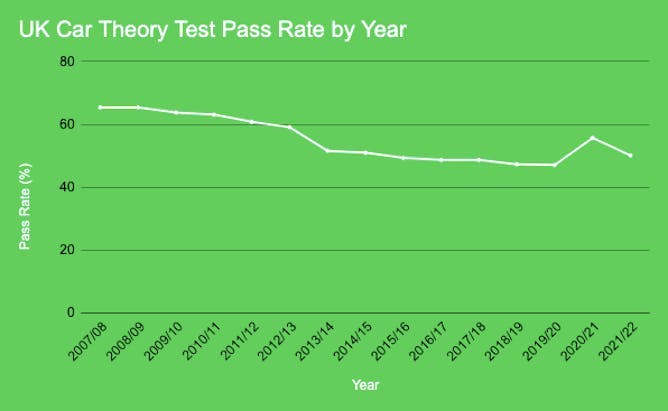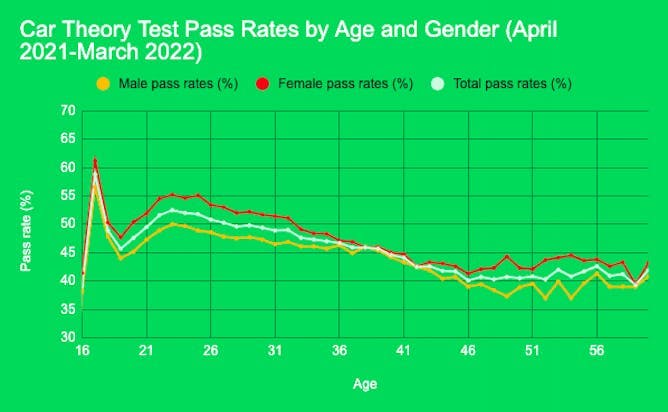
There are several stages to becoming a driver—and before you get to prove your competence at parallel parking or clutch control in slow traffic, you need to have demonstrated your knowledge about UK roads and shown a good awareness of the potential hazards you may face on them.
That’s the job of the theory test. It weeds out candidates who haven’t learnt what to do in the event of an accident, don’t have an up-to-date understanding of driving laws or have failed to grasp the impact of weather and road conditions on safety. And weed them out it does: passing the theory test isn’t the foregone conclusion that many learners expect.
We’ve delved into the latest DVSA statistics to give you an insight into where theory test pass rates are highest, which candidates perform better and how you can give yourself the best possible chance of success.
Overview of car theory test pass rates

Data source: Department for Transport
The driving theory test has evolved over the years, and some of the changes have led to interesting fluctuations in pass rates. For instance, previously high pass rates—at one point nearly 7 in 10—dropped to just over 50% in 2013/14. There were clear reasons for this:
- The DVSA stopped publishing multiple choice questions online
- A refreshed question bank was introduced—meaning that, during revision, candidates rarely came across exact questions they might be asked on their test day
- Interpreters and foreign-language voiceovers were no longer allowed
Essentially, the test became better suited to those with a deeper grasp of the theory behind safe driving, rather than anyone who had learnt answers to specific questions by rote.
Pass rates remained fairly stable for the next half decade, but did drop slightly year on year. Between April 2019 and March 2020, only 47.1% of all tests were passed.
It’s likely that a number of factors influenced this trend, including:
- The hazard perception part of the theory test being updated to include CGI (computer-generated imagery) clips. The idea was to make them as realistic as possible and better aligned to real-world driving scenarios. But some candidates may have found this change challenging.
- More difficult tests. The DVSA is said to have raised the standard of the UK theory test over the years, to ensure learners are able to prove a higher level of knowledge.
Good news, though: pass rates between April 2020 and March 2022 indicate that, once again, more candidates passed than failed. Lockdowns and the scarcity of tests may have played a role, as it gave people the time and incentive to revise.
If that’s the case, the pandemic effect might be over for now, because results from April-September 2022 aren’t looking nearly so promising. However, we’ll have to wait a bit for the full 2022-23 statistics to be released—so we’re hopeful things have improved since then.
Theory test pass rates by demographics
The DVSA publishes results by age, gender and theory test centre. Let’s have a look at the specifics.
Age
We know that for the practical test, pass rates tend to decrease with age. It turns out there’s a similar trend with the theory. The pass rate drops off significantly for candidates over the age of 40: 50.2% of 39-and-unders pass, but only 41.8% of anyone older.
In fact, the younger the better, it would seem. Those under the age of 20 have the highest pass statistics on their side, with 17-year-olds the most likely to conquer the exam.
Rates decrease for every age group thereafter—except, interestingly, the over 60s, who are more likely to succeed than those aged 50-59. Perhaps the figures are driven up by retirees with more time on their hands to revise? We can only speculate.
Gender

Data source: Department for Transport
While guys have the slight upper hand on practical tests, female candidates tend to perform better on the theory. In the year ending March 2022, girls and women consistently achieved higher pass rates than their male counterparts in every age group. There are a few theories about why this might be the case, including research by the people behind app Driving Theory Test 4 in 1, which suggests that female candidates usually conduct more revision than male learners. If that’s the case, there seems to be a pretty easy way for anyone to improve their chances of passing first time round: simply study more.
But we get that it can be difficult to know where to begin, easy to become overwhelmed by the sheer amount of material, and tough to motivate yourself with self-directed learning—so we’ve done something to help. We’ve launched PassMeTheory: an interactive small group session that will take you exactly what to expect during your test, an overview of the topics you need to be comfortable with—and a deep dive into the most challenging areas you’ll be tested on.
Location
It shouldn’t matter where in the UK you take your theory test; there’s no regional difference in the complexity of questions you’ll face—and, since you’re sitting at a computer, road or weather conditions outside the test centre shouldn’t matter one jot.
But, inevitably, there are some places where candidates tend to perform better, and others where pass rates fall down. Comparing pass rates at centres that conducted over 1000 theory tests between April and August 2022, we can see that the was a whopping 16.4% difference in outcomes between the best and worst places to sit the exam.
Test centres with the highest and lowest car theory test pass rates (April - September 2022)
Highest Theory Test Pass Rates
- Guildford: 54%
- Royal Tunbridge Wells: 53.8%
- Cambridge: 53.8%
- Aberystwyth: 52.9%
- Stratford-upon-Avon: 52.6%
- Brighton: 52.3%
- Exeter: 52.3%
- Harrogate: 51.7%
- Kendal: 51.3%
- Cheltenham: 50.7%
Lowest Theory Test Pass Rates
- Bradford: 37.6%
- Uxbridge: 38.1%
- Ilford: 39.1%
- King's Lynn: 39.2%
- Boston: 39.4%
- Leicester: 40.1%
- Newport (Gwent): 40.6%
- Middlesborough: 40.6%
- Doncaster: 40.8%
- Dudley: 41%
Based on test centres that conducted over 1000 tests
Source: Department for Transport
This analysis is interesting on a national level, but don’t be put off if you book in at a test centre with lower pass rates—or, on the other hand, complacent if you’re not. There’s no room for subjectivity on a theory test, so it’s really down to your preparation and how well you can perform under pressure.
Specific question categories on the theory test
There are 14 theory test topics the DVSA wants to make sure you know about—and while they all require a good bit of revision, some are more likely to trip you up than others. Here are some areas that you may struggle with, and how you can get ahead of the curve.
Hazard awareness
In addition to the hazard perception part of the theory test, you’ll also be asked questions about static and moving hazards—including how you can become one, too!
Vehicle Safety
You must demonstrate knowledge on how best to maintain your vehicle, perform safety checks and know what to do in an emergency situation.
Alertness
Alertness is all about your ability to concentrate on the road, how aware you are of your surroundings and how well you can spot potential and developing hazards. You’ll need to know what measures you can take to avoid distracted driving, the best ways to make your vehicle visible to others and how to overtake in the safest possible way.
Attitude
Perhaps self-explanatory, but this topic focuses on your attitude as a driver. We share the roads with other drivers, cyclists, pedestrians and animals, all of whom you need to think about as you travel. ‘Attitude’ covers areas like making your intentions clear by your road position and indicators, being considerate to other road users, and knowing when to relinquish your desire for priority.
Safety margins
This topic includes stopping distances (yes, you need to know exactly how long it would take to stop in an emergency at any given speed), how far behind another vehicle you should travel, and how you should adapt your following distance in different weather or road conditions.
And more...
There are also questions within the rules of the road, motorway rules and accidents sections that learners often get wrong. Don’t worry though—we go through them in PassMeTheory, so you won’t make the same mistakes.
4 Tips for improving your performance on the theory test

- Many topics might seem vague at first. Don’t neglect them in favour of other sections which seem more important or ‘concrete’.
- Never assume you can blag questions on areas like attitude and alertness. Although there are obvious ways to be a considerate driver, the test focuses on specific safe driving behaviours and what they mean in practice. The examiners want to be sure that you will be able to manage stressful situations safely and limit driving distractions.
- If you’re able to, practise hazard perception on a computer, and ideally using a mouse, to simulate test conditions. Your reactions might differ slightly if you’re used to tapping on a screen.
- Learn the difference between a potential hazard and a developing hazard. The former is something to watch out for; the latter will require you to take action. The hazard perception section tests your ability to spot developing hazards only.
How do the theory test pass rates affect you personally?
Clearly, there are certain characteristics that seem to equate to a better chance at passing the theory test: being young, female and living in an affluent area all seem to give you the edge. But, thankfully, that’s not the whole story. Revision—however you do that best—and practice are probably the most important factors in whether you beat the odds.
If you want a jump start (and would prefer not to end up spending thousands of pounds on failed tests like these people) then just add PassMeTheory onto any driving course package. You’ll take away tips that really work and the confidence to get the job done. We’ll see you soon!
Subscribe for driving advice, offers & more
We'd love to let you know about our courses, news and offers via email. You may unsubscribe at any time.
Star Genie Limited trading as PassMeFast. Company number 10093359
Copyright © 2024 owned by Star Genie Limited
PassMeFast, Blue Tower, MediaCityUK, Salford, M50 2ST
